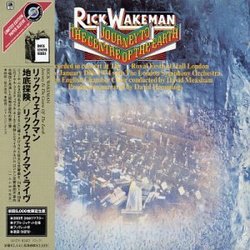Once Experimental; Now Classic
Lonnie E. Holder | Columbus, Indiana, United States | 11/09/2005
(5 out of 5 stars)
"It's easy to look down your nose at the Model T when you have a Trans Am or a Corvette, or an SUV or truck for that matter. However, in the day of the Model T, it was something to which everyone aspired.
So too we have an entire class of album that was more common and popular in the 70s than before or since: the story theme album. Epitomized by Jeff Wayne's outstanding "War of the Worlds," the story album is the concept album taken to an extreme, setting a story in a musical framework. Rick Wakeman tried several variants on this style of album, with probably "Journey to the Centre of the Earth" and "Return to the Centre of the Earth" being the most evolved.
With so few entries in this genre, by definition the few that are there are the best. How fortunate that "Journey to the Centre of the Earth" really is good. I recall listening to a vinyl version of this album often in the mid-70s, along with a large group of nerdy electronics technicians because the structure and uniqueness of the music appealed to us. The synthesizers Rick Wakeman used were state-of-the-art at the time, and his skill was phenomenal.
As I listen to the music now, you could readily guess it is 70s music. The riffs and arrangement have that 70s flavor. Regardless, the music retains its appeal. There are so many influences in this music that it would be difficult to point out half of them. Certainly Rick brought his Yes influences. You could perhaps feel a bit of Hendrix in spots, maybe some Moody Blues, perhaps even a bit of Isaac Hayes. Throw in an orchestra and you have something that at that time was very progressive.
Okay, the lyrics are nothing to write home about. They are simple, almost juvenile. Fortunately they are not the main attraction; the music is. The lyrics do tell part of the story, so you should still understand what the singer is saying.
Other than the other story albums of the time, and the more symphonic productions of Yes, the closest album I can think of similar to this in terms of style is The Moody Blues "Days of Future Passed," which is completely different in concept.
I think that the music is well-matched to the goal of this album, not over-blown or pretentious. However, recall that much symphonic music is by its nature overblown and pretentious. Consider, as an example, Tchaikovsky's 1812 Overture; definitely overblown and pretentious. Who cares? It is good music, done well.
As with much of the music I enjoy, this album is not for everyone. It is a niche album for those who like the fusion of rock and classical, with synthesizers and a story thrown in for good measure. There are a variety of styles represented, including Rick Wakeman's unique style. If you are still unsure whether you would like this, borrow a copy or download a portion from someone and give it a listen. If Yes and the Moody Blues are your idea of exciting music, I'm betting this album will soon be on your list of favorites.
Note that this particular version is an imported Japanese version. There are other versions available with variations in content and price. Be sure you find the version that meets your needs best before you buy.
"


 Track Listings (2) - Disc #1
Track Listings (2) - Disc #1